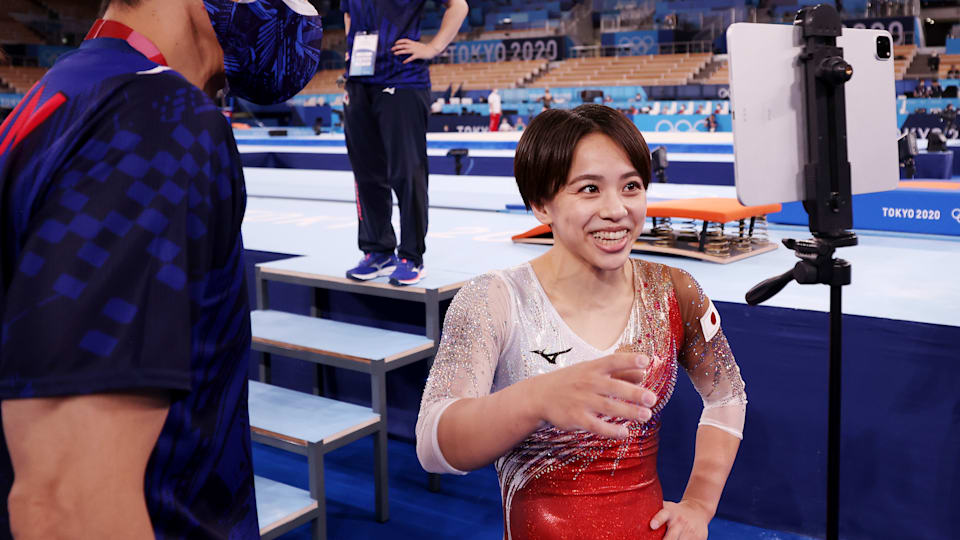
When MURAKAMI Mai set foot in the Ariake Gynasium Centre for the women’s preliminaries on 25 July, she went in with an entirely different mindset compared to her first Olympic Games at Rio 2016.
“In Rio I was just happy to be there”, Murakami said in an interview with Olympics.com at Nippon Sport Science University’s Yokohama Kenshidai Campus, her training base.
“I was telling everyone I wanted to win a medal and all that but there was a part of me that settled with having a good performance.
“Once competition began and we finished fourth in the team and seventh on the floor, I became annoyed at myself for not trying harder, knowing I might have had a shot at a medal if I had.
“We did well as a team and as much as I was happy about that, I wasn’t wholly satisfied either. But that’s what made me want to work for Tokyo and looking back on it now, I’m glad I felt the way I did then.
“My desire for a medal doesn’t compare with what it was for Rio. Because of the way I was back then, I’m a lot more engaged now”.
The last five years have been nothing short of a rollercoaster ride for Murakami, who followed up Rio by winning the floor at the 2017 world championships – the first gold medal won by a Japanese woman in 63 years.
The upward trajectory continued. At the worlds the following year, Murakami captured silver in the all-around, a first for her country. Two years out of Tokyo 2020, everything seemed to be right on track.
Then it all unraveled in May 2019.
As she was practising for the NHK Trophy which served as the trials for the world championships, Murakami’s lower back – an injury she had been dealing with on and off – gave out.
The pain was such that it not only forced her out of the worlds, it nearly forced her to call it a career. She described herself as “an emotional mess”.
“It was a serious enough injury that I thought I might never be able to compete again”, Murakami said. “I could aggravate it if I started pushing myself again and I really wasn’t sure if it was worth all the risk.
I thought about retiring when I first got hurt and couldn’t compete. But I still had this itch to compete. Deep down inside I knew I loved gymnastics and felt it wasn’t something I could run from.
“The day I was injured I didn’t want anyone talking to me. I didn’t want to know.
“I don’t think anything will be as hard as these last three years – coming back from the injury then dealing with the postponement. Nothing.
“I feel a lot tougher now. Let’s just say I have a much thicker skin”.
Burden of proof
Murakami qualified for Tokyo 2020 after sweeping the All Japan Championship and NHK Trophy this April and May, respectively. She not only made the team but with two-time Olympian and her best friend TERAMOTO Asuka falling short in her comeback from a torn Achilles, Murakami was handed the captaincy.
“I want to be someone they can count on. It’s a team competition so any individual mistake affects everyone”, said Murakami, who joked about feeling “old” at 23.
“I need to be dependable. I want to be able to pick up the slack because mistakes do happen. It’s part of gymnastics. How you respond to it is what matters.
“When you’re with the national team you practice twice the amount, everyone’s tense and it’s a lot more taxing than usual, physically and mentally.
I want them to see me work so that inspires them to work. That’s how I see my job.
I want to lead by example rather than saying things or through words.
Throughout these Games Murakami has more than embraced the big sister role to Olympic rookies HATAKEDA Hitomi, HIRAIWA Yuna and SUGIHARA Aiko.
They managed to finish fifth in the team event after shaking off early jitters and in the all-around, Murakami – who was 14th five years ago – finished fifth despite a banged-up elbow, the best result ever by a female Japanese gymnast.
Unlike in Rio, Murakami, when she’s not plugged into BTS and NiziU, or watching TV, has been on a mission of sorts at Tokyo 2020, carrying herself with a sense of obligation and responsibility for not just for her teammates but also for her country.
She wonders how her fellow Olympians carried that burden. Why YOSHIDA Saori, the three-time women’s wrestling gold medallist, felt compelled to apologise to the entire nation when her bid for a fourth came up short.
Or what the swimmer IKEE Rikako (who Murakami wants to meet and befriend more than anyone among all the Japanese athletes) kept telling herself as she overcame leukemia and qualified for Tokyo 2020 against all odds.
Looking at her second Olympic Games in the rearview mirror Murakami knows that she has left it all out there at the Ariake Gymnastics Centre.
